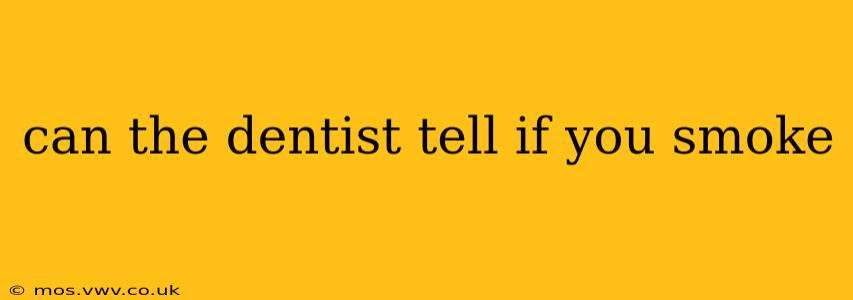Can the Dentist Tell if You Smoke?
Yes, dentists can often tell if you smoke, and they have several ways to detect it. The telltale signs aren't just limited to the smell; experienced dentists notice a range of oral health issues strongly associated with smoking. This article will explore how dentists identify smokers and the impact smoking has on oral health.
What are the visible signs a dentist looks for?
Dentists are trained to observe subtle indicators during routine examinations. These include:
-
Persistent Bad Breath (Halitosis): The smell of smoke is a significant giveaway, even if you've brushed your teeth. The odor is often described as acrid and lingers despite oral hygiene efforts.
-
Stained Teeth: Tobacco stains are a classic sign. The staining is typically yellowish-brown, but the intensity varies depending on the type of tobacco used and the duration of smoking. These stains are often more pronounced along the gum line.
-
Gum Disease (Periodontitis): Smoking significantly increases the risk of gum disease. Dentists look for signs of inflammation, bleeding gums, receding gums, and pockets of infection between the teeth and gums. These are often more severe in smokers than in non-smokers.
-
Slow Wound Healing: Smokers often experience slower healing times after dental procedures like extractions or gum surgery. This delayed healing can be a noticeable indicator.
-
Increased Risk of Oral Cancer: Dentists will carefully examine the mouth and surrounding tissues for any signs of oral cancer, which is significantly more prevalent in smokers. This involves checking for unusual lumps, sores, or white or red patches.
-
Dry Mouth (Xerostomia): Smoking can reduce saliva production, leading to dry mouth. This can increase the risk of cavities and gum disease.
How can smoking affect my dental health?
The impact of smoking on oral health is extensive and detrimental:
-
Increased Risk of Gum Disease: Smoking impairs the body's ability to fight infection, making smokers far more susceptible to gum disease, which can lead to tooth loss if left untreated.
-
Higher Risk of Oral Cancer: The carcinogens in tobacco dramatically elevate the risk of developing various types of oral cancer.
-
Delayed Healing After Procedures: The reduced blood flow caused by smoking hinders the healing process following dental work.
-
Tooth Loss: The cumulative effects of gum disease and delayed healing can result in tooth loss.
-
Bad Breath: Persistent bad breath is a common complaint among smokers, stemming from the chemicals in tobacco.
Does my dentist have to report my smoking habit?
No, your dentist is bound by patient confidentiality and does not have to report your smoking habit to anyone. The information they gather is used to assess your oral health and provide appropriate treatment and advice. However, they may discuss the risks associated with smoking and offer guidance on quitting if you are willing to listen.
Can a dentist tell if you've recently smoked?
While the lingering smell of smoke provides a strong clue, it's more difficult for a dentist to determine if you've smoked very recently, within the last few hours, for example. The most reliable indicators are the long-term effects described above.
Can a saliva test detect smoking?
While saliva tests can detect nicotine and cotinine (a nicotine metabolite), these aren't routinely used in dental practices for determining smoking status. They are more commonly used in research settings or for specific monitoring purposes.
In conclusion, while not every smoker will show all the signs mentioned above, the combination of persistent bad breath, stained teeth, gum disease, and slower healing can be strong indicators that a patient smokes. A dentist's professional observation and thorough examination can often reveal a smoking habit. If you are a smoker, open communication with your dentist is vital for maintaining optimal oral health. They can provide valuable advice and support regarding smoking cessation to improve your overall well-being.
